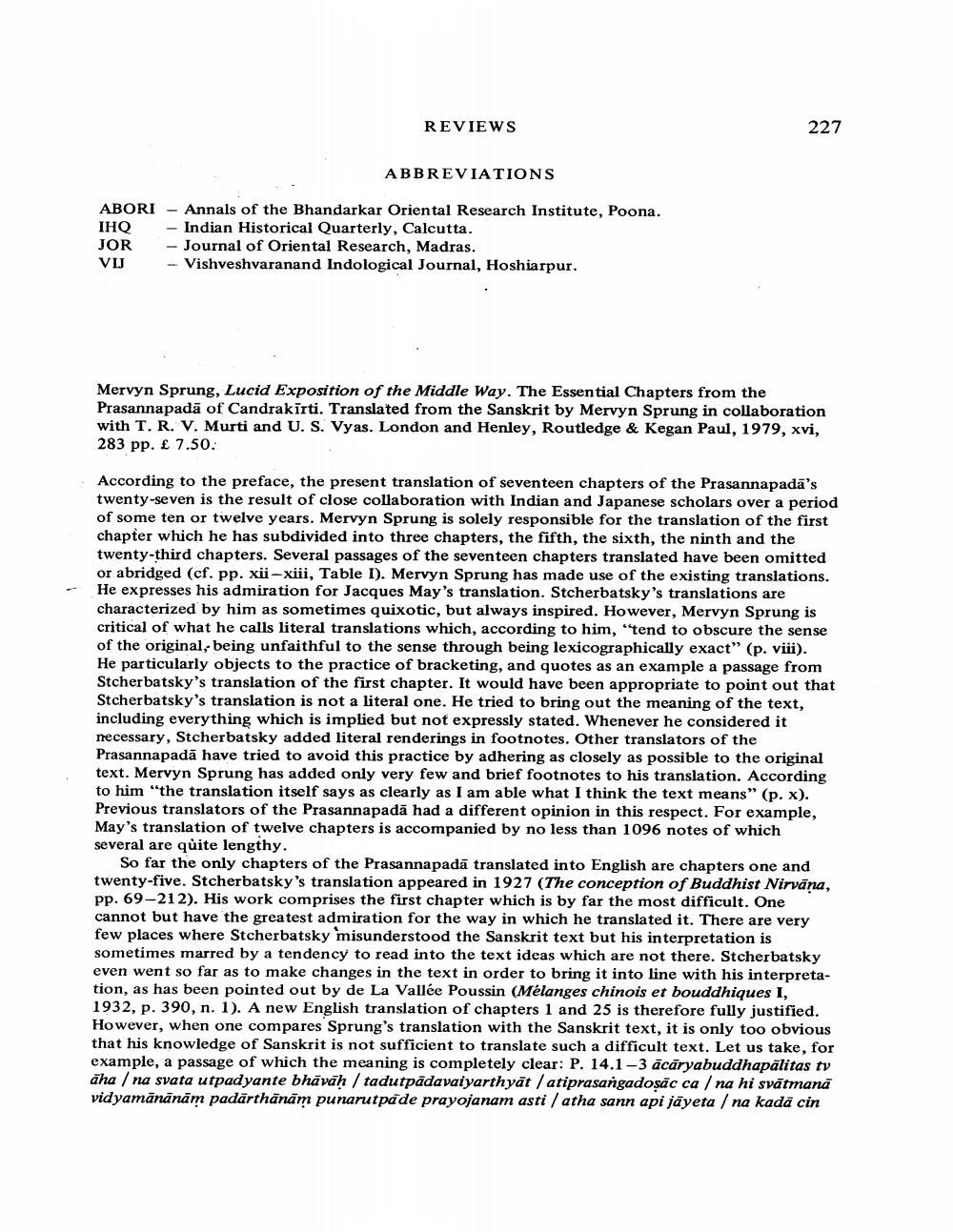Book Title: Book Reviews Author(s): J W De Jong Publisher: J W De Jong View full book textPage 9
________________ REVIEWS 227 ABBREVIATIONS ABORI - Annals of the Bhandarkar Oriental Research Institute, Poona. IHO - Indian Historical Quarterly, Calcutta. JOR - Journal of Oriental Research, Madras. VIJ - Vishveshvaranand Indological Journal, Hoshiarpur. Mervyn Sprung, Lucid Exposition of the Middle Way. The Essential Chapters from the Prasannapadā of Candrakirti. Translated from the Sanskrit by Mervyn Sprung in collaboration with T. R. V. Murti and U.S. Vyas. London and Henley, Routledge & Kegan Paul, 1979, xvi, 283 pp. £ 7.50. According to the preface, the present translation of seventeen chapters of the Prasannapada's twenty-seven is the result of close collaboration with Indian and Japanese scholars over a period of some ten or twelve years. Mervyn Sprung is solely responsible for the translation of the first chapter which he has subdivided into three chapters, the fifth, the sixth, the ninth and the twenty-third chapters. Several passages of the seventeen chapters translated have been omitted or abridged (cf. pp. xii-xiii, Table 1). Mervyn Sprung has made use of the existing translations. He expresses his admiration for Jacques May's translation. Stcherbatsky's translations are characterized by him as sometimes quixotic, but always inspired. However, Mervyn Sprung is critical of what he calls literal translations which, according to him, 'tend to obscure the sense of the original, being unfaithful to the sense through being lexicographically exact" (p. viii). He particularly objects to the practice of bracketing, and quotes as an example a passage from Stcher batsky's translation of the first chapter. It would have been appropriate to point out that Stcherbatsky's translation is not a literal one. He tried to bring out the meaning of the text, including everything which is implied but not expressly stated. Whenever he considered it necessary, Stcherbatsky added literal renderings in footnotes. Other translators of the Prasannapadă have tried to avoid this practice by adhering as closely as possible to the original text. Mervyn Sprung has added only very few and brief footnotes to his translation. According to him "the translation itself says as clearly as I am able what I think the text means" (p. x). Previous translators of the Prasannapada had a different opinion in this respect. For example, May's translation of twelve chapters is accompanied by no less than 1096 notes of which several are quite lengthy. So far the only chapters of the Prasannapadā translated into English are chapters one and twenty-five. Stcherbatsky's translation appeared in 1927 (The conception of Buddhist Nirvana, pp. 69-212). His work comprises the first chapter which is by far the most difficult. One cannot but have the greatest admiration for the way in which he translated it. There are very few places where Stcherbatsky misunderstood the Sanskrit text but his interpretation is sometimes marred by a tendency to read into the text ideas which are not there. Stcherbatsky even went so far as to make changes in the text in order to bring it into line with his interpretation, as has been pointed out by de La Vallée Poussin (Mélanges chinois et bouddhiques I, 1932, p. 390, n. 1). A new English translation of chapters 1 and 25 is therefore fully justified. However, when one compares Sprung's translation with the Sanskrit text, it is only too obvious that his knowledge of Sanskrit is not sufficient to translate such a difficult text. Let us take, for example, a passage of which the meaning is completely clear: P. 14.1-3 ācāryabuddhapälitas tv āha / na svata utpad yante bhāvah / tadutpädavaiyarthyāt / atiprasangadosāc ca / na hi svātmanā vid yamānanam padärthänām punarutpáde prayojanam asti / atha sann api jäyeta / na kadä сinPage Navigation
1 ... 7 8 9 10 11 12 13 14 15 16 17 18 19 20 21 22 23 24 25 26
